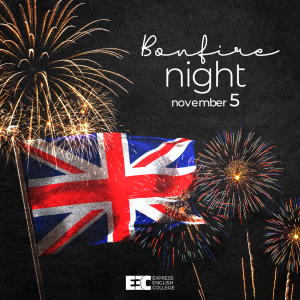
Study English in the UK
Study English in the UK

It’s a singularly unique moment in the British calendar. The smell of pungent smoke wafting through the air. An underfoot crunch of yellow leaves accompanied by the piercing wheeeee! of constant Catherine Wheels from all corners of the neighbourhood. Explosive bangs all night long and plenty of cider and sticky toffee apples. That’s right, Bonfire Night is upon us on the 5th November. It’s extremely British and bloody good fun! But what exactly do all these strange traditions mean, and where do they come from?
Bonfire Night is widely celebrated in all parts of the UK and well loved by Brits. As the chill and gloom of a long winter undeniably wraps its cold arms around the country in November, settling in for around a quarter of the year, this hearty festivity is something to look forward to. It breaks up the time between the clocks changing at the end of October (and the subsequent evenings getting dark at around 4.30 p.m., sob!) and Christmas. Bonfire Night parties are a popular occurrence in both private residences and in public parks. However the history of this jovial evening is somewhat rather darker than the festivities might lead one to believe.
Bonfire Night is also sometimes called Guy Fawkes night, after an important and much maligned figure in British history. Guy Fawkes was a soldier who in 1605, along with accomplices, attempted to blow up Parliament by placing barrels of gunpowder in a room beneath the main Parliament chambers. This is why Bonfire Night is also sometimes referred to as the Gunpowder Plot. Guy Fawkes was a Catholic and the Protestant King James I did not allow Catholics to openly practise their religion. Guy Fawkes was therefore registering his dissent (in the strongest possible way). All members of the Gunpowder Plot were captured and publicly executed. In order to ensure that this incredible act of treason would never be forgotten, Parliament ordered a national day of celebration to give thanks that the King’s life had been saved. A ‘guy’ – a man made of clothes and straw – was thrown on a fire to emulate Guy Fawkes every year (British Council).
It serves as testament to the power of the monarchy in the United Kingdom that this idiosyncratic celebration has lasted for over four hundred years. Although nowadays most British people are largely divorced from the meaning of what they are celebrating on Bonfire Night, it is still a historical and momentous occasion every year. Children even still learn the following nursery rhyme in school for Bonfire Night. How much of this old-fashioned way of writing can you understand?
Remember, remember the Fifth of November,
The Gunpowder Treason and Plot,
I know of no reason
Why the Gunpowder Treason
Should ever be forgot.
Guy Fawkes, Guy Fawkes, t’was his intent
To blow up the King and Parli’ment.
Three-score barrels of powder below
To prove old England’s overthrow;
By God’s providence he was catch’d
With a dark lantern and burning match.
Holla boys, Holla boys, let the bells ring.
Holloa boys, holloa boys, God save the King!
And what should we do with him? Burn him!
So what traditions are a staple part of Bonfire Night? Firework displays are arguably the most exciting part of Bonfire Night, with the inky-black British night sky peppered with colourful explosions all night long. (Petitions are actually launched every year to ban the sale of fireworks as they can frighten house pets) (BBC News). A bonfire is, of course, essential. Bonfires are built in back gardens and in parks. Apples are dipped in sticky toffee and Parkin cake is also enjoyed by Brits in the North of England.
Unfortunately most Manchester-based events have been cancelled this year due to the ongoing COVID-19 restrictions. However, plenty of events can still be enjoyed in Stockport, Trafford, Thameside, Wigan and Oldham. Check out the list of events running here. And don’t forget to wear gloves when writing your name with a sparkler!
Study English in the UK
BBC News. (2019) Bonfire Night: Are these traditions fizzling out? Available at: Bonfire Night: Are these traditions fizzling out? – BBC News. [Accessed 3 November 2021]
British Council. (n.d) Bonfire Night. Available at: Bonfire Night | – | LearnEnglish (britishcouncil.org). [Accessed 3 November 2021]
Tags: EEC experience, English Language Learning Manchester Green School, English Language school, general English 20 lessons, General English with homestay, IELTS, StudyngintheUK